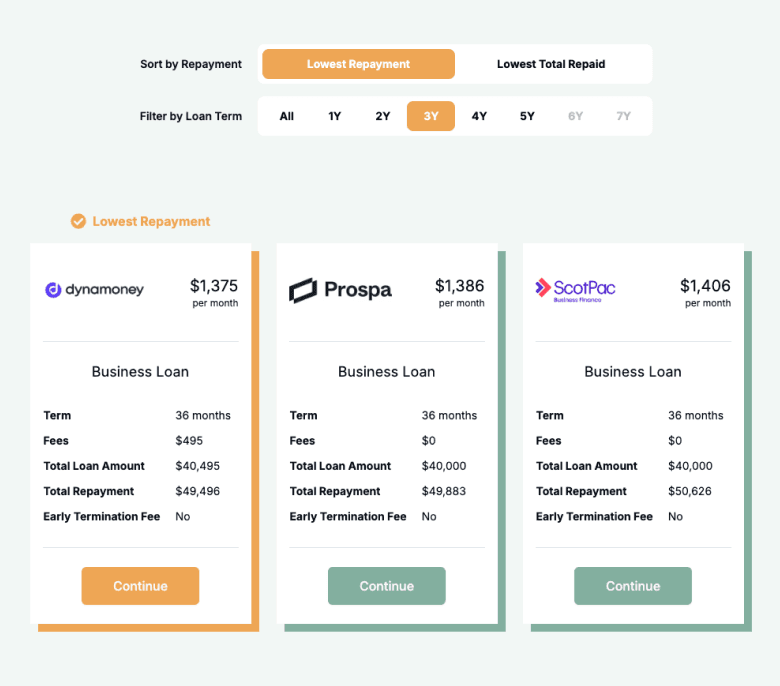Compare Business Overdrafts from 50+ Australian Lenders
Link an overdraft to your business account and access extra funds when cash is tight. Pay interest only on the amount you use.
5.0 rating


Business Overdrafts Made Simple
Attach an overdraft facility to your business account for short-term cash flow support. Ideal for SMEs and sole traders who want a flexible safety net to manage seasonal fluctuations, pay suppliers, or cover payroll on time.
Flexible Limits
Typical overdrafts range from $10,000 to $250,000
Pay as You Use
Interest applies only on the overdrawn balance
Linked to Your Bank Account
Funds draw automatically when your balance drops
No Fixed Term
Overdrafts remain active while your account is in good standing
Short-Term Solution
Designed for immediate, not long-term, financing
Preserve Cash Flow
Cover gaps between expenses and receivables
How it works
A business overdraft sits alongside your everyday bank account, automatically covering payments when your balance runs low.
Apply in minutes
Tell us about your business and connect your bank account so lenders can review your eligibility.
Get matched
Our Lender Match technology compares overdraft offers from multiple lenders.
Approval
Once approved, the overdraft is linked to your business account, ready for use.
Use when needed
When your account balance drops below zero, the overdraft automatically covers payments up to your limit.

A quick guide to business overdrafts
A business overdraft is a revolving credit facility linked directly to your trading account. It allows your balance to go into negative up to an agreed limit, providing a safety net when cash flow is tight. You only pay interest on the overdrawn balance, and the facility remains available as long as your account is in good standing.
Unlike a business loan that provides a lump sum, overdrafts are designed for short-term use and day-to-day flexibility. They’re commonly used to cover payroll, pay suppliers, purchase stock, or bridge invoice gaps.
While overdrafts provide fast access to funds without the need to reapply, they often carry higher interest rates than secured loans and may include annual facility fees. For many Australian businesses, the benefit of automatic, always-available funds makes overdrafts a vital cash flow tool, especially during seasonal or unexpected downturns.
Want to skip ahead?
This guide is broken down into the following sections. Click a link if you want to skip ahead.
What can I use a business overdraft for?
Overdrafts are best for short-term or unexpected business needs. Common uses include:
Cash Flow Management
Bridge short-term gaps in income and expenses by allowing your account to temporarily go into negative.
Unexpected Expenses
Cover emergency repairs, urgent bills, or unplanned costs without delaying operations.
Inventory Purchases
Order stock ahead of peak demand or take advantage of supplier discounts with overdraft support.
Short-Term Funding
Finance temporary projects or working capital needs without committing to a lump-sum loan.
Payroll Management
Ensure staff are paid on time, even if invoices are still outstanding.
Supplier Payments
Pay suppliers promptly to maintain strong relationships and supply continuity.
Seasonal Demand
Smooth out the highs and lows of seasonal income with an always-available buffer.
Business Opportunities
Act quickly on unexpected opportunities with immediate access to funds.
Invoice Gaps
Keep operations running while waiting on client payments to clear.
Tax Payments
Use overdraft funds to meet tax obligations on time and avoid penalties.
Case Study

James Walker, JW Constructions
Keeping Staff Paid with a Business Overdraft
Industry: Construction
Challenge: Delayed client payments created a payroll shortfall.
Solution: A $50,000 overdraft facility linked to the business account.
James runs a small construction company and faced a cash flow crunch when two major client invoices were delayed. With payroll due, he drew on a $50,000 overdraft to cover wages and supplier bills. Once payments came through, the overdraft was repaid automatically. Having the facility in place gave James confidence that staff and projects would never be disrupted by late payments again.
How much can I borrow with a business overdraft?
In Australia, business overdraft limits typically start from $10,000 and can extend to several million for established companies. Most SMEs access facilities between $10,000 and $250,000. The limit depends on your turnover, cash flow, and banking history. Lenders assess financial statements, profitability, and credit profiles before approving. Overdrafts are usually unsecured, but some lenders may require a personal guarantee. Always borrow responsibly and ensure your business can comfortably repay the overdrawn balance.
Business Overdraft Cost Calculator
Estimate interest costs for using an overdraft. Adjust the limit, term, and interest rate to see potential costs.
Balance over time
Am I eligible for a business overdraft?
Business overdrafts are linked to your trading account, so eligibility often depends on your banking relationship and account history. Lenders also review credit history, turnover, and trading time.
You may be eligible if you are:
An Australian citizen or permanent resident
Over 18 years old
Trading for at least 12 months
Minimum monthly turnover of $10,000
Holding an active business bank account
How to apply for a business overdraft?
Complete a quick application with details of your business account and turnover. We’ll match you with overdraft offers from 50+ lenders. Once approved, the overdraft is linked to your bank account and available for immediate use.
Documents you may need:
ABN and GST registration details
Photo ID (passport or driver’s licence)
Recent business bank statements
Financial statements or tax returns
How to save money on a business overdraft
Because overdrafts are designed for short-term use, the best way to save money is to minimise how long your account stays in the negative. Repaying quickly reduces interest costs and keeps the facility ready for emergencies.
Compare multiple overdraft offers, as facility fees and interest rates can vary. Look for hidden costs such as annual fees, non-utilisation charges, or transaction costs. If your business has strong cash flow, using the overdraft as a back-up rather than a daily tool will keep costs lower.
Finally, align overdraft use with predictable inflows such as invoices or seasonal revenue so you can repay quickly and avoid extended interest charges.
Understanding business overdraft options
Overdrafts can vary by structure, cost, and security. Comparing these options ensures you choose the right facility for your needs.
Secured vs Unsecured
Most overdrafts are unsecured, but some lenders may request collateral for higher limits or lower rates.
Personal Guarantee
Many lenders require a personal guarantee from the business owner or directors to reduce risk.
Interest Charges
Interest is applied only to the overdrawn balance. However, rates are often higher than term loans.
Facility Fees
Annual or monthly fees may apply, plus transaction or non-utilisation charges depending on the bank.
Repayment Flexibility
As income flows into your account, it automatically reduces the overdraft balance without extra effort.
Limit Reviews
Banks may review your overdraft annually and adjust the limit based on turnover and repayment history.
Testimonials
Verified Review
The process with Emu Money has been fantastic — completely stress-free. Thank you EMU Money I cannot thank the team enough. Having been given an opportunity to get a loan when my bank turned us away. The service team has been absolutely brilliant. When you've become used to waiting times of an hour or more with other companies - I don't think I have waited more than a couple of minutes for this team. Plus, their phone staff are so nice to deal with. Great job. I just had to acknowledge it.
Pardeep M.
Verified Review
Great boutique provider of finance services. Emu were very helpful in improving my financial situation, despite the fact they had to do most of it remotely. Highly regarded and completely trusted. A+++
Thomas M.
Verified Review
Every problem that occurred during the approval process Evie found a solution. Anyone looking for a financial solution needs to have Evie on their side
Pat F.
Verified Review
We recently had the pleasure of working with Eujin to secure a car loan, and we couldn't be more grateful for his assistance. Eujin went above and beyond to ensure we got the best possible terms. His professionalism, dedication, and willingness to help were evident throughout the entire process. Thank you, Eujin, for making this experience smooth and stress-free. Highly recommend his services!
Bstl 1.
Verified Review
Incredibly seamless experience! Highly recommend
Tracy W.
Verified Review
We recently purchased a vehicle. Peter was very helpful, with clear instructions and real outcomes. Within 48 hrs the deal was done, only 3-5 emails, a couple of phone calls. That was a super efficient experience. We would go back!
Kishan K.
Frequently Asked Questions
Business Overdraft FAQs
These helpful FAQs will help you find the answers you need. If you can't find what you're looking for, you can request a callback below.








































































